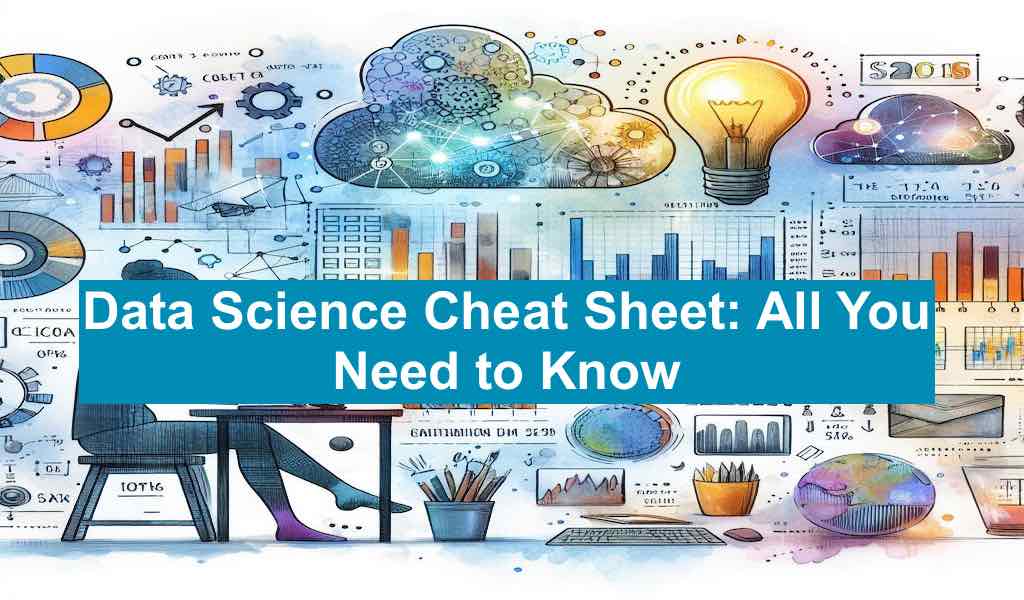
Data science is a fascinating field that combines various disciplines to extract valuable insights from data. Let’s explore it in a detailed cheat sheet.
Table of Contents
Introduction
Data science is a rapidly growing field that combines statistics, mathematics, programming, and domain expertise to extract insights and knowledge from data. As a data scientist, you need to be proficient in various tools, techniques, and concepts to effectively analyze and interpret data. To help you navigate this complex landscape, we’ve compiled a comprehensive data science cheat sheet that covers all the essential topics you need to know.
Definition:
- Data science unifies statistics, data analysis, informatics, and related methods to understand and analyze real-world phenomena using data.
- It draws techniques from mathematics, statistics, computer science, information science, and domain expertise.
What Data Scientists Do:
- Construct Questions: Data scientists frame questions around specific datasets.
- Analyze Data: They use data analytics and advanced techniques to find patterns, create predictive models, and develop insights.
- Guide Decision-Making: These insights guide business decisions and strategies.
Key Aspects:
- Interdisciplinary: Data science combines statistics, scientific computing, algorithms, and domain knowledge.
- Extracting Knowledge: It extracts insights from potentially noisy, structured, or unstructured data.
- Transforming Data: Data scientists clean, transform, and prepare data for analysis.
- Visualization: Insights are presented through reports and visualizations.
Why It Matters:
- Organizations depends on data scientists to interpret the data and provide actionable recommendations.
- Due to its significance and influence to the Organization, the position of a data scientist has been called the “job of the 21st century.”
Impact:
- Data scientists provide actionable recommendations.
- Their role is crucial for informed decision-making.
Data Science Tools
Data scientists rely on widely-used programming languages for tasks such as exploratory data analysis and statistical regression analysis. These open-source tools facilitate pre-built statistical modeling, machine learning, and visualisation capabilities.
Data science tools are essential for extracting valuable insights from data. They aid in data cleaning, manipulation, visualization, and modeling. Here are some popular tools that are directly or indirectly helping data scientists on their work:
- Python: A versatile programming language widely used for data analysis, processing, and machine learning.
- R: A scientific and statistical language with a large developer community.
- SQL: A relational database language for querying and managing structured data.
- NoSQL: For handling non-relational databases.
- Cloud computing: Provides online computing platforms for data processing.
- Git: A version control tool for collaborative development.
- Visual Studio Code: A code editor and IDE.
- SPARK: Used for big data processing.
- Docker: A containerization platform.
- Airflow: A workflow management tool.
- Jupyter Notebook: Offers a web-based interface for interactive data analysis.
- The Command Line: Essential for executing commands and scripts.
- GitHub Actions: Supports CI/CD pipelines.
- MLFlow: Used for managing the machine learning lifecycle.
- Databricks: Provides a unified data platform.
These tools empower data scientists to explore, analyze, and model data effectively.
Essential Topics to Understand
1. Data Preprocessing
- Data cleaning and handling missing values
- Feature engineering and selection
- Data normalization and standardization
- Exploratory Data Analysis (EDA)
2. Machine Learning Algorithms
- Supervised Learning
- Linear Regression
- Logistic Regression
- Decision Trees and Random Forests
- Support Vector Machines (SVM)
- Naive Bayes
- K-Nearest Neighbors (KNN)
- Unsupervised Learning
- K-Means Clustering
- Hierarchical Clustering
- Principal Component Analysis (PCA)
3. Model Evaluation and Validation
- Train/Test Split
- Cross-Validation
- Bias-Variance Tradeoff
- Accuracy, Precision, Recall, F1-score
- Root Mean Squared Error (RMSE) & Mean Squared Error (MSE)
- Confusion Matrix
- Receiver Operating Characteristic (ROC) Curve & Area Under the Curve (AUC)
4. Python Libraries and Tools
- NumPy: Numerical computing
- Pandas: Data manipulation and analysis
- Matplotlib and Seaborn: Data visualization
- Scikit-learn: Machine learning
- TensorFlow and PyTorch: Deep learning
- Jupyter Notebook: Interactive coding and documentation
5. SQL and Databases
- SQL basics (SELECT, JOIN, GROUP BY, etc.)
- Relational databases (PostgreSQL, MySQL, etc.)
- NoSQL databases (MongoDB, Cassandra, etc.)
6. Big Data and Distributed Computing
- Hadoop and MapReduce
- Apache Spark
- Cloud computing (AWS, GCP, Azure)
7. Communication and Visualization
- Data storytelling
- Data visualization best practices
- Presenting insights and recommendations
Cheat Sheet
Here’s a concise reference sheet covering essential concepts and terms:
Definition and Statistics
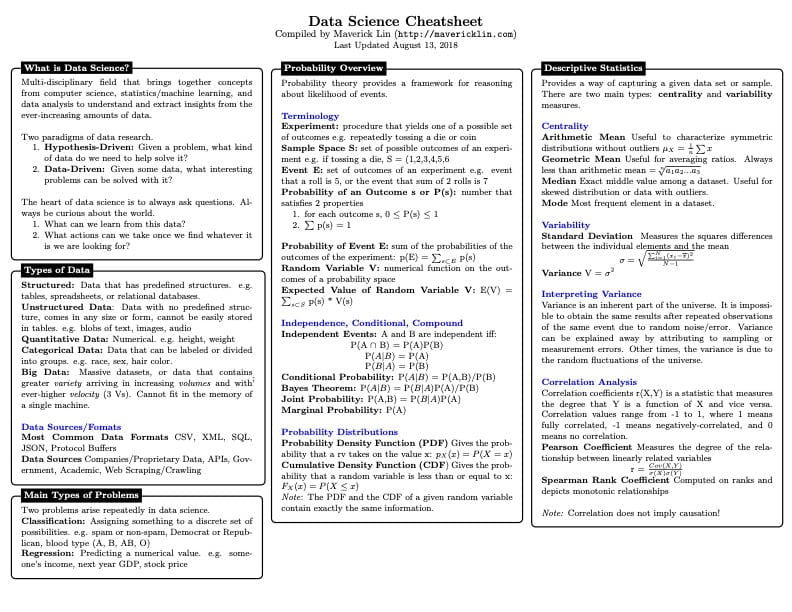
Data Cleaning, Feature Engineering and Analysis
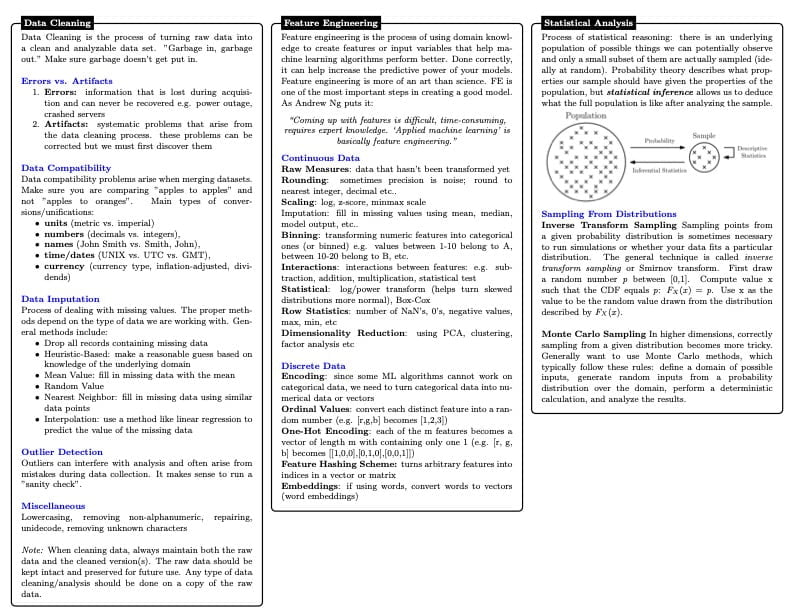
Modeling in Data Science: I
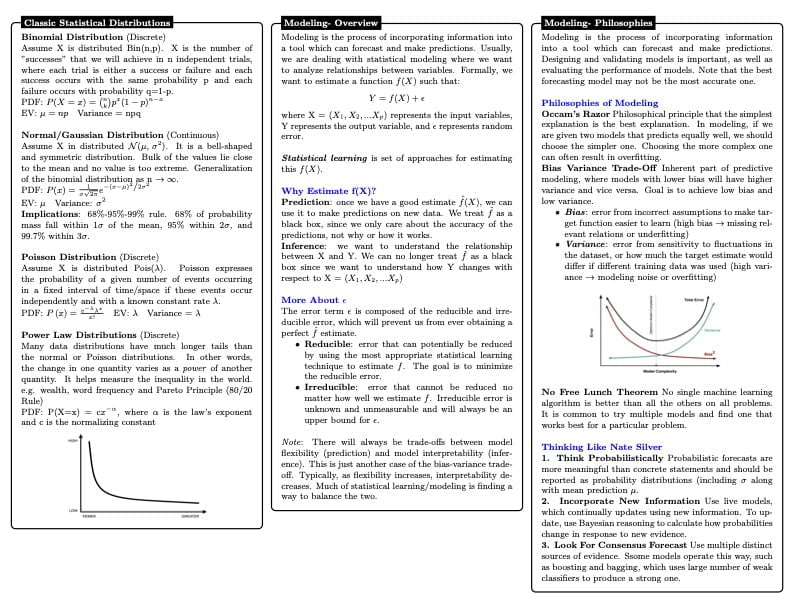
Modeling in Data Science: II
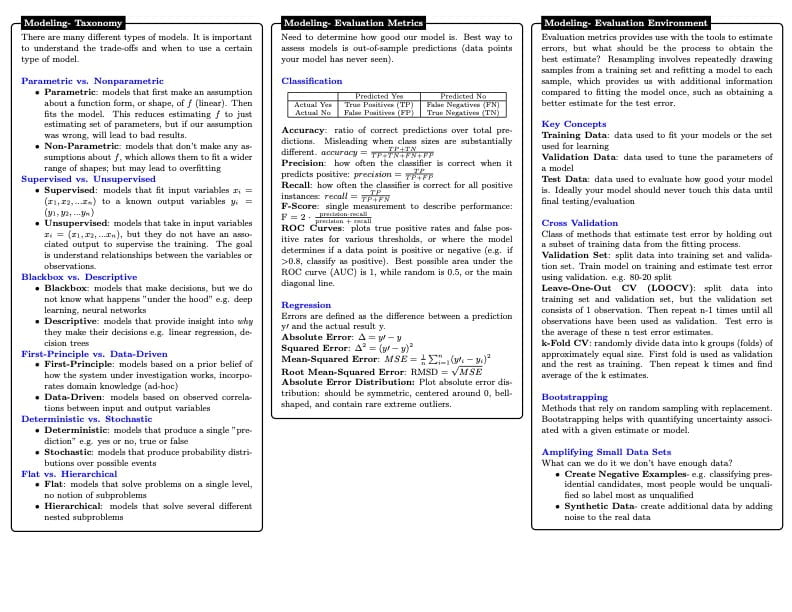
Data Science: ML Algorithms I
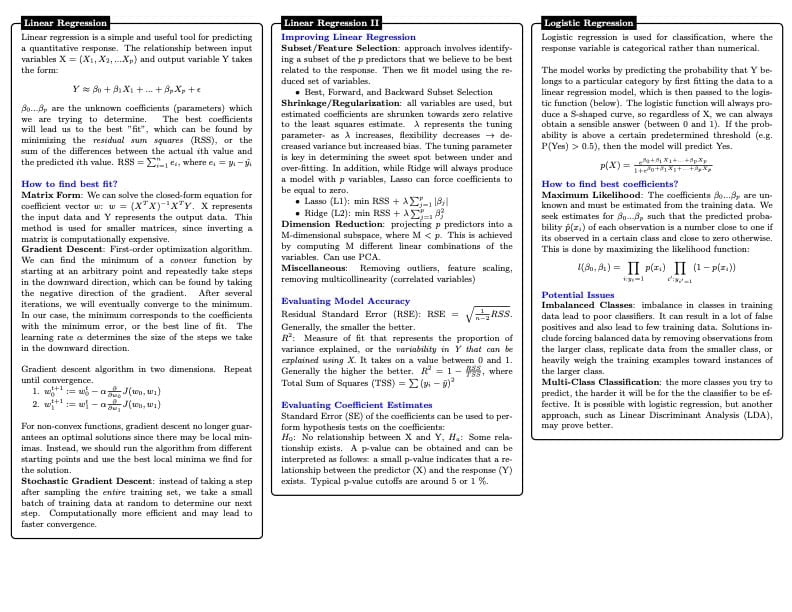
Data Science: ML Algorithms II
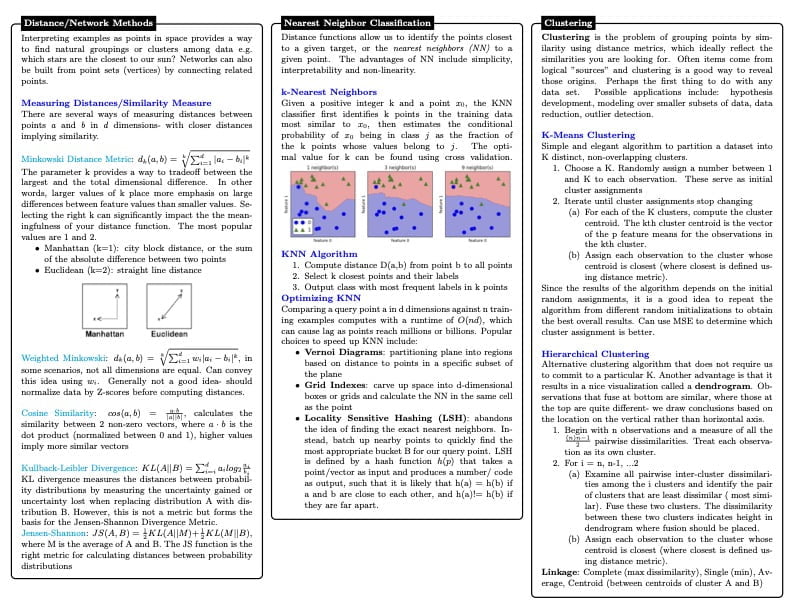
Machine Learning
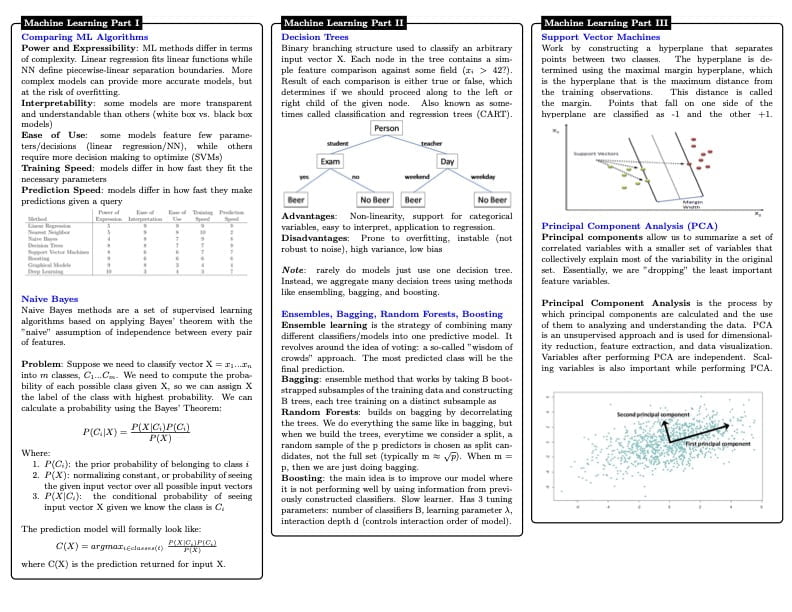
Machine Learning and Deep Learning
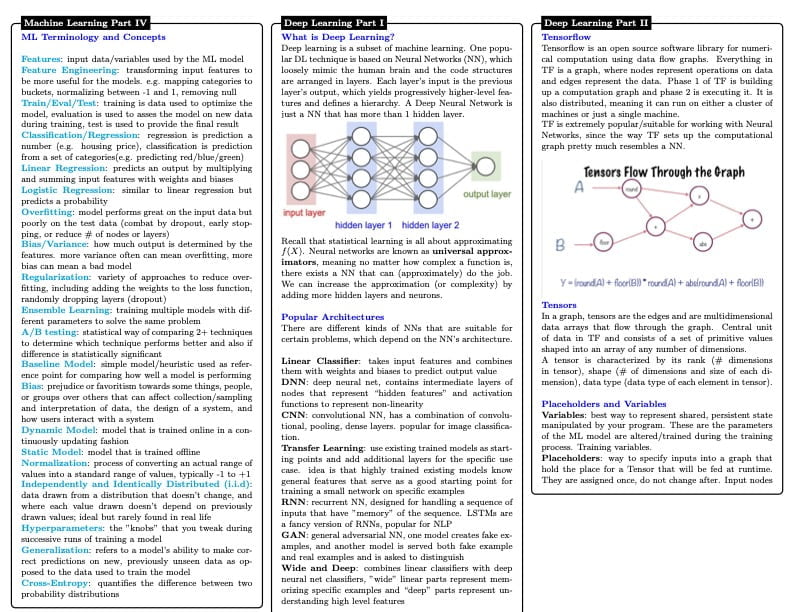
Deep Learning
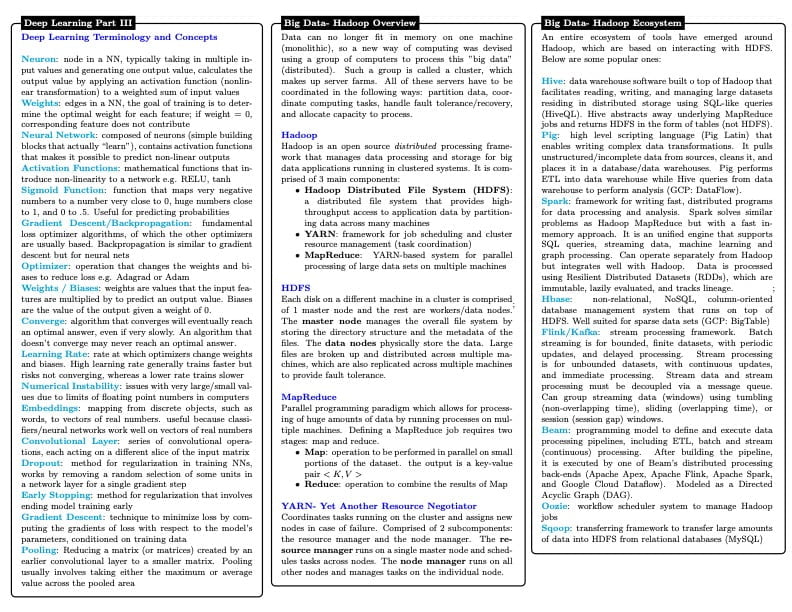
SQL and Python
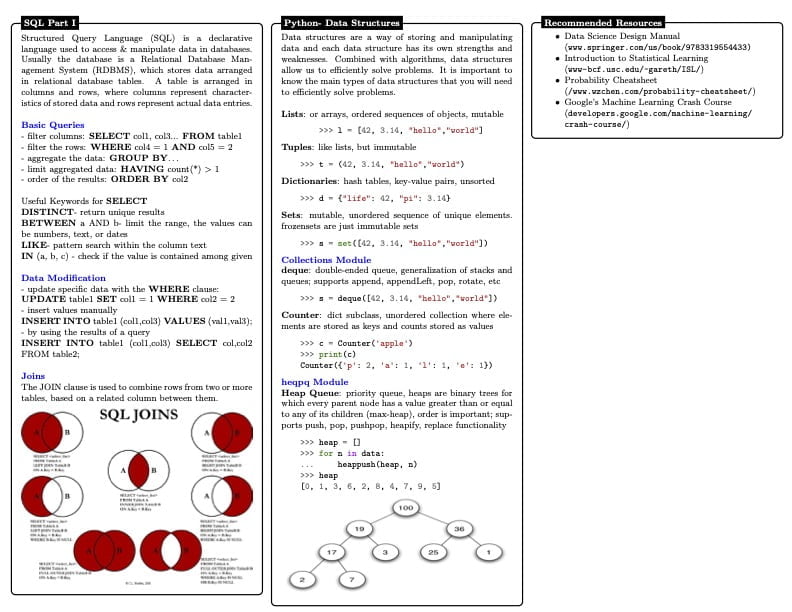
Summary
In summary, data science empowers us to unlock hidden knowledge from data, driving better decisions and innovation across industries. This data science cheat sheet provides a high-level overview of the essential topics you need to master to become a proficient data scientist. However, it’s important to note that data science is a vast and constantly evolving field, and this cheat sheet is just the beginning. Continuous learning, staying up-to-date with the latest trends and technologies, and hands-on practice are crucial for success in this field.
Learn more about related topics
- Algebra and Calculus
- Machine Learning: A Quick Refresher & Ultimate Cheat Sheet
- Machine Learning Algorithms: How To Evaluate The Pros & Cons
- Supervised Learning Cheat Sheet
- Unsupervised Learning Cheat Sheet
- Probability and Statistics
- Deep Learning Cheat Sheets
- Data Science by IBM

Thank you for the valuable information on the blog.I am not an expert in blog writing, but I am reading your content slightly, increasing my confidence in how to give the information properly. Your presentation was also good, and I understood the information easily.
For more information Please visit the 1stepGrow website or AI and data science course.